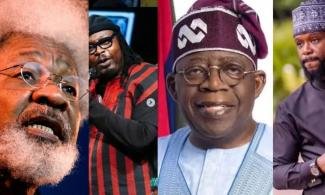Veteran Nigerian rapper, Eedris Abdulkareem’s protest track, “Tell Your Papa,” has recorded a remarkable milestone despite being banned by the National Broadcasting Commission.
The song, which criticises President Bola Tinubu’s administration, has gathered the attention of several Nigerians and has been making waves on social media.
According to the statistics on YouTube, ‘Tell Your Papa’ has 22,754 views on YouTube with 1,200 likes and the video numbers have since skyrocketed to 82,138 views and 2,600 likes, on YouTube too, indicating a surge in popularity amid the controversy.
On Spotify, the song has also reached a notable milestone with over 30,116 streams, indicating that Nigerians are still streaming the song despite the ban.
NBC sparked criticism after it banned “Tell Your Papa” from airplay on April 10.
The commission cited a breach of broadcasting code, but Eedris Abdulkareem responded by condemning the government for suppressing dissent and constructive criticism.
He likened the ban to the censorship of his iconic hit “Jaga Jaga” in 2004, accusing the current administration of being “insensitive and vindictive”.
Abdulkareem took to Instagram to express his views on the ban, stating, “It’s obvious that in Nigeria, truth and constructive criticism is always deemed a big crime by the government.”
The ban was also faulted by the Performing Musicians Association of Nigeria, which predicted that the ban would be counterproductive and make people want to stream it more.
Similarly, in a statement on Sunday, Nobel laureate Professor Wole Soyinka also condemned the NBC over the ban, describing it as a return to the culture of censorship and a threat to the right to free expression.
Soyinka criticised the action and its wider implications, saying it echoed past attempts to stifle artistic and socio-political commentary in Nigeria.
He expressed irony in suggesting that the ban did not go far enough, stating, “It is not only the allegedly offensive record that should be banned – the musician himself should be proscribed. Next, PMAN, or whatever musical association of which Abdulkareem is a member, should also go under the hammer.”
The literary icon warned that such censorship was not only counterproductive but also dangerous to democratic development.
![]()










